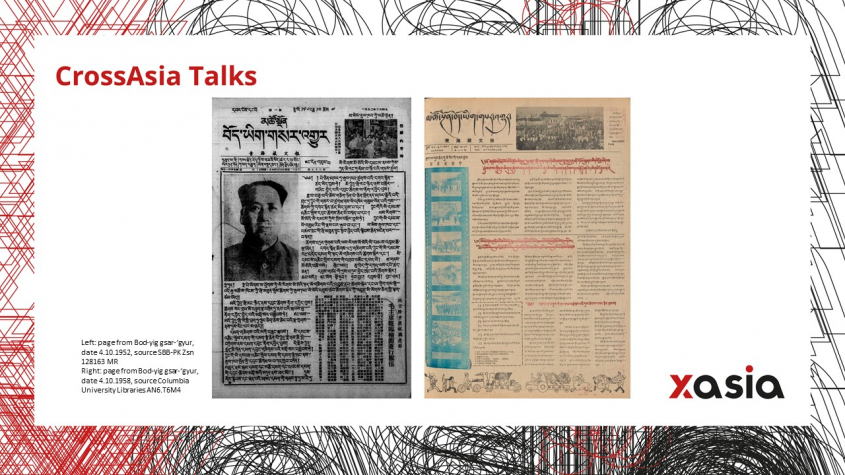From Print to Digital: Making Available Tibetan Newspapers as a Historical Source
(See English below)
Wir beschließen das Jahr mit einem CrossAsia Talk von Dr. Franz Xaver Erhard (Universität Leipzig) am 12. Dezember 2024 ab 18 Uhr (MEZ) mit dem Titel: From Print to Digital: Making Available Tibetan Newspapers as a Historical Source. Herr Erhard wird das Forschungsprojekt Divergent Discourses vorstellen und insbesondere auf die Verwendung und Bedeutung von Digital Humanities-Methoden in seiner Forschung eingehen. Der Vortrag wird online stattfinden.
The Sino-Tibetan history of the 1950s and 1960s is relatively unknown and highly contested. At the same time, sources on the period are scarce and local archives – if they exist – are generally closed to outside researchers. The few existing collections, including the one at the Berlin State Library (german: Staatsbibliothek zu Berlin), of Tibetan newsprint and contemporary publications offer rare insights into the events but also the official presentation of events at the very time when they were taking place. The UK-German research project Divergent Discourses takes up this opportunity to study the events and narratives in newspapers of the period to understand how they became woven into cohesive yet diverging discourses on Tibet.
In the field of Tibetan Studies, Digital Humanities approaches are just emerging, and often the most essential tools are still wanted – the Divergent Discourses project has grappled with a multitude of challenges to digitisation posed by the Tibetan language and script, the complexity of newspaper layout, and the lack of Natural Language Processing tools for Tibetan and thus adapted existing or created new tools to build a workflow for the digitisation and analysis of a modern Tibetan text corpus.
The presentation will showcase the Divergent Discourses project’s approaches and Digital Humanities tools geared to unlock a large corpus of Tibetan historical newspapers for the first time as a source for a historical study of the emergence and development of conflicting concepts, ideas and discourse strategies.
Die Vortragssprache ist Englisch. Bei Fragen kontaktieren Sie uns unter: ostasienabt@sbb.spk-berlin.de.
Der Vortrag wird darüber hinaus via Webex gestreamt und aufgezeichnet*. Sie können am Vortrag über Ihren Browser ohne Installation einer Software teilnehmen. Klicken Sie dazu unten auf „Zum Vortrag“, folgen dem Link „Über Browser teilnehmen“ und geben Ihren Namen ein.
Alle bislang angekündigten Vorträge finden Sie hier. Die weiteren Termine kündigen wir in unserem Blog und auf unserem X-Account an.
—
We will end the year with a CrossAsia Talk by Dr. Franz Xaver Erhard (Leipzig University) on December 12, 2024 from 6 pm (CET) entitled: From Print to Digital: Making Available Tibetan Newspapers as a Historical Source. Mr Erhard will present the Divergent Discourses research project and in particular discuss the use and significance of digital humanities methods in his research. The lecture will take place online.
The Sino-Tibetan history of the 1950s and 1960s is relatively unknown and highly contested. At the same time, sources on the period are scarce and local archives – if they exist – are generally closed to outside researchers. The few existing collections, including the one at the Berlin State Library (german: Staatsbibliothek zu Berlin), of Tibetan newsprint and contemporary publications offer rare insights into the events but also the official presentation of events at the very time when they were taking place. The UK-German research project Divergent Discourses takes up this opportunity to study the events and narratives in newspapers of the period to understand how they became woven into cohesive yet diverging discourses on Tibet.
In the field of Tibetan Studies, Digital Humanities approaches are just emerging, and often the most essential tools are still wanted – the Divergent Discourses project has grappled with a multitude of challenges to digitisation posed by the Tibetan language and script, the complexity of newspaper layout, and the lack of Natural Language Processing tools for Tibetan and thus adapted existing or created new tools to build a workflow for the digitisation and analysis of a modern Tibetan text corpus.
The presentation will showcase the Divergent Discourses project’s approaches and Digital Humanities tools geared to unlock a large corpus of Tibetan historical newspapers for the first time as a source for a historical study of the emergence and development of conflicting concepts, ideas and discourse strategies.
The lecture will be held in English. If you have any questions, please contact us: ostasienabt@sbb.spk-berlin.de.
The lecture will also be streamed and recorded via Webex*. You can take part in the lecture using your browser without having to install a special software. Please click on the respective button “To the lecture” below, follow the link “join via browser” (“über Browser teilnehmen”), and enter your name.
You can find all previously announced lectures here. We will announce further dates in our blog and on X.


 Covergestaltung Katrin Schacke, Offenbach, unter Verwendung eines Bildes von © Borges Samuel / Alamy.
Covergestaltung Katrin Schacke, Offenbach, unter Verwendung eines Bildes von © Borges Samuel / Alamy. Portraitfoto Gabriele Tergit © Moses Mendelssohn Stiftung
Portraitfoto Gabriele Tergit © Moses Mendelssohn Stiftung